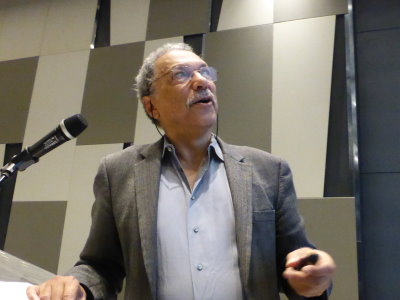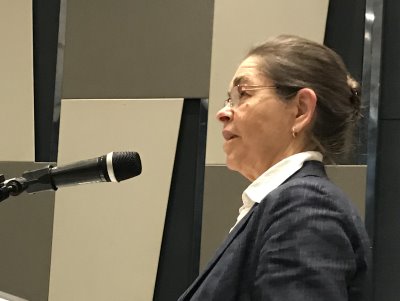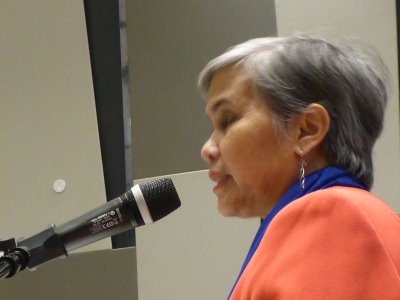 On 12 January 2018, Oceana Philippines convened a conference on “Law Enforcement and Science: Restoring Filipino Fisheries” in Quezon City, Metro Manila, that featured world renowned fisheries scientist, Prof. Daniel Pauly, among other speakers. "Overfishing destroys ecosystems and erodes food security," explained Prof. Pauly at the event.
On 12 January 2018, Oceana Philippines convened a conference on “Law Enforcement and Science: Restoring Filipino Fisheries” in Quezon City, Metro Manila, that featured world renowned fisheries scientist, Prof. Daniel Pauly, among other speakers. "Overfishing destroys ecosystems and erodes food security," explained Prof. Pauly at the event.
Pauly is the Principal Investigator of the Sea Around Us at the University of British Columbia in Canada and a co-founder of FishBase.org. Together with his team, he produced global, multi-year analyses of fish catches, which have helped the public understand the sad plight of the oceans – particularly the fact that fish populations all over the world are plummeting.
In the Philippines, Oceana is known, e.g. for its stop-trawling campaign and struggle for better protection of the ecologically important Benham Rise Seascape. It works closely with different government agencies towards restoration of fisheries resources by making use of the Filipino constitution and laws that make provisions for marine protection.
Blessed with 36,000 kilometers of coast, nearly 30,000 square kilometers of coral reefs and about 1170 square kilometers of mangroves, the Philippines is among Earth’s richest countries in terms of marine biodiversity. In 2014, it ranked eighth among the top fish producing countries in the world, with total production amounting to 4.7 million tonnes of seafood.
 However, overfishing, illegal fishing, pollution, climate change and the destruction of critical marine habitats are taking a toll on the country’s ability to produce food. According to the Bureau of Fisheries and Aquatic Resources, 10 out of 13 fishing grounds or about 75 per cent of the country’s fishing sites are overfished. The University of the Philippines Marine Science Institute and the Biodiversity Management Bureau further revealed that less than 1 per cent of Philippine coral reefs are in excellent condition – an alarming fact, taking into account that many species of fish and invertebrates live and breed in coral reefs.
However, overfishing, illegal fishing, pollution, climate change and the destruction of critical marine habitats are taking a toll on the country’s ability to produce food. According to the Bureau of Fisheries and Aquatic Resources, 10 out of 13 fishing grounds or about 75 per cent of the country’s fishing sites are overfished. The University of the Philippines Marine Science Institute and the Biodiversity Management Bureau further revealed that less than 1 per cent of Philippine coral reefs are in excellent condition – an alarming fact, taking into account that many species of fish and invertebrates live and breed in coral reefs.
In 2015, the Philippine Fisheries Code was amended, bolstering enforcement efforts such as requiring fishing boats to adopt vessel-monitoring technologies. The government is now looking at science-based fisheries tools like harvest-control rules and reference points, while setting stiffer penalties for fishing violators. However, enforcement hasn’t been smooth-sailing.
Also among the invited speakers was Dr Cornelia E Nauen, President of Mundus maris. She spoke about the challenges to fisheries governance and the opportunities arising for improved enforcement through increasing the perceived legitimacy of the law and regulations. In the light of experiences elsewhere and the different levers used in conventional and traditional management, she invited to explore multi-layered approaches. Especially the rise of transnational organised crime often using fishing operations as smoke-screens for other illegal practices, including drug running and human trafficking, warranted good cooperation between a wide range of agencies within the country and with its neighbours. Click here to see the slides.
 “These alarming wake-up calls should compel all of us to work together to finally stop and eradicate illegal and destructive fishing,” says Oceana Philippines Vice President Atty. Gloria Estenzo Ramos. “Coastal local government units and national agencies like the Department of Agriculture, Department of Environment and Natural Resources, Department of the Interior and Local Government and our police and armed forces must ramp-up enforcement efforts to protect the marine resources we still have. Local communities must continue to collaborate with various stakeholders and be vigorously engaged in assessing and evaluating performance of public authorities in coastal and marine protection and take action to ensure sustainable management of our fisheries.”
“These alarming wake-up calls should compel all of us to work together to finally stop and eradicate illegal and destructive fishing,” says Oceana Philippines Vice President Atty. Gloria Estenzo Ramos. “Coastal local government units and national agencies like the Department of Agriculture, Department of Environment and Natural Resources, Department of the Interior and Local Government and our police and armed forces must ramp-up enforcement efforts to protect the marine resources we still have. Local communities must continue to collaborate with various stakeholders and be vigorously engaged in assessing and evaluating performance of public authorities in coastal and marine protection and take action to ensure sustainable management of our fisheries.”
Video footage of the event, pictures and more materials are available on the Oceana Philippines Facebook page.

Group photo of conference participants (Photo OCEANA)








